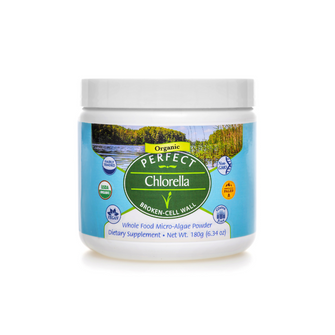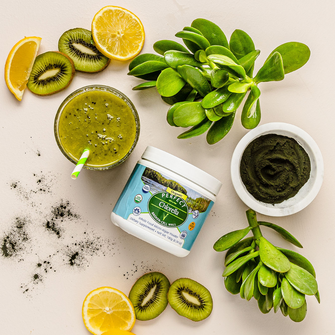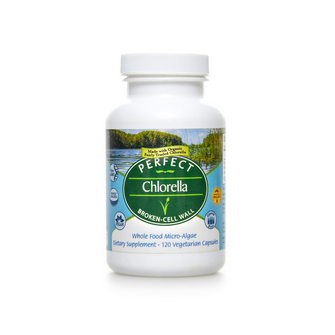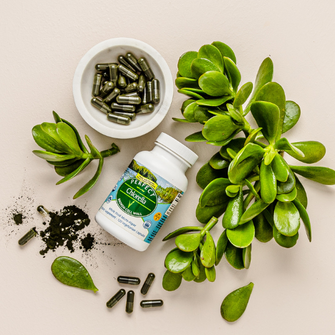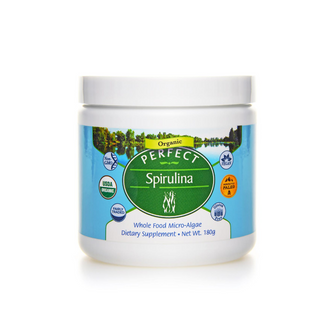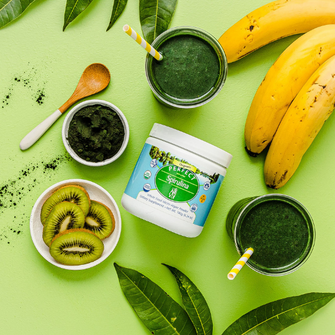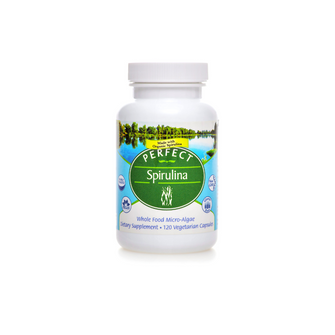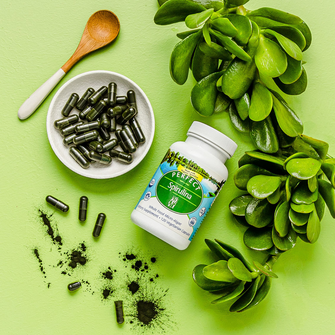Categories
Related Products
Not Just Any Microalgae
When we refer to 'microalgae,' we are talking about spirulina and chlorella. Two of the most incredible freshwater plant superfoods on the planet!
There are two primary types of algae - micro and macro. Macro refers to the seaweed that washes up on the beach, and while these contain iodine (a vital nutrient for thyroid and breast health) and fibre, this is not the same as microalgae spirulina and chlorella.
Spirulina and chlorella are in a league of their own. They are both quite different. Today's blog intends to highlight these differences and tips on getting the most out of using them.
The blog will discuss the differences between the two, their nutrient profile, the best times to take them, and some interesting facts that need more common knowledge.
Let's start with spirulina.
Spirulina is one of the oldest microalgae on the planet and one of the most nutrient-dense. International institutions have endorsed spirulina since the 70s. The UN had a global conference on spirulina in 1974, declaring it the answer to world hunger.
Spirulina is the panacea to malnutrition in third-world countries such as India and other parts of Asia.
NASA endorsed spirulina for having 1000x more nutrition than any other fruit or vegetable! It's been said that 1g of spirulina has the same nutrition as 1kg of fruits and veggies!
The fact that it is so rich in nutrition (including being one of the highest concentrations of protein) and that spirulina is one of the most sustainable crops in the world is why.
Before we go into the nutrition aspect, we'd like to talk more about what makes spirulina so great (and preferable to vegetables) for some.
Stay with me here.
If you know much about plant toxins (the plant's defense mechanism), you will know that many vegetables contain chemicals and proteins that aren't meant to be consumed by humans or animals.
There are many plant toxins, but the two main ones (people are talking about) are lectins and oxalates. They can have a detrimental effect on the gut lining and health. But the good news about spirulina (and chlorella) is that because they are freshwater plants (and not land plants), they have not needed to create a defense system, so they do not contain any plant toxins.
Popular amongst people on animal-based diets (like carnivores). Microalgae may help to fill in some nutritional gaps.
Spirulina contains two pigments - a blue pigment (phycocyanin) and a green pigment (chlorophyll). Phycocyanin is a water-based pigment (test this out in a glass of water).
Chlorella is the highest in chlorophyll, but we will get to chlorella soon.
Spirulina Benefits (potentially)
-
Spirulina nutrition is rapidly absorbed
- Energy booster (not in a stimulating way but in a refreshing, sustainable way)
- Popular amongst people with CFS
- Natural anti-inflammatory
- It may help with MCAS & HIT as it has an antihistamine effect
- It may help with allergies & rhinitis
- It may have a positive impact on IgA levels
- Great for athletes or anyone active
- Potential anticancer effects
- Focus and productivity (great for students or busy people)
- Cleansing but not chelating
- It's a powerful antioxidant
- It may help with chronic arsenic poisoning or exposure to radiation of any kind
- Modulates the production of cytokines
- Mother nature's Multivitamin (can replace many other supplements)
- Nutrient-dense and loaded with EFAs
- An excellent source of protein (in the usable form of amino acids)
- It contains superoxide dismutase (a powerful antioxidant and amino acid)
- Popular amongst biohackers (people looking to upgrade their biology)
- Can replace veggies in the diet
- No contraindications
- It is very alkalising
- It is a natural vasodilator - thus allowing the o2 and nutrients to flow freely)
- Ketogenic (no carbs): won't decrease ketones/increase glucose
- Safe nutrition for every age*
*In Japan, if a baby can't get milk from its mother for whatever reason, spirulina and water will be given to the baby to nourish and sustain it. That is because spirulina's nutrient profile is almost identical to mothers' breast milk.
Spirulina is a complete protein containing all nine amino acids your body cannot make, plus 18 of the 20 essential amino acids. It has 3 x the amount of protein compared to a steak. What's important to know also is that the protein is available in amino acid form, making it readily available.
Protein must be converted into amino acids, so it's much more work for the body. Spirulina (and chlorella) contain amino acids, so it's easy for your body to get the nutrition it requires.
More Spirulina Nutrition
-
Spirulina is a fantastic source of B vitamins (including B12). B vitamins are essential for energy.
- It contains omega-3 (one known as GLA). GLA is depleted in people with Pyrrole's disorder, so spirulina could greatly help these people.
- It contains boron which is known to help with bone health, vitamin D production, testosterone production, wound healing, cellular & metabolic function, hormonal, neurological, and mental health (helps synapses in the brain)
- Spirulina is one of the highest plant-based iron sources, making it great for anaemics or people looking for safer alternatives to iron supplements.
Spirulina is a freshwater plant, but it is also a healthy bacteria. Spirulina is a cyanobacterium - it does not have a cell wall. As it doesn't have a cell wall, it is easy for your body to break down and access all of that incredible nutrition.
As you know, there are good and bad bacteria (you have both in your gut), so think of spirulina as your friend - he is one of the good guys.
Microalgae can help to boost nutrition and help you detox.
There are toxins everywhere! We take them in through food, drink, vehicle exhaust fumes, environment, cleaning, cosmetics, and personal care products. These factors are essential considering our toxic world and our less-than-ideal lifestyles.
The soils our food grows in are depleted; even organic soils are depleted*.
*Unless it's a biodynamic organic farm and not run by a big corporation.
Microalgae = Essential Nutrition (spirulina) + Detox & Recovery (chlorella)
How to Take Spirulina
You may prefer to take it in powder form, or you might like capsules. Either way, the best time to take spirulina is during the day. We don't suggest taking spirulina at night or later in the afternoon because it contains B vitamins, and B's give you energy so it may interfere with sleep.
On the other hand, chlorella is best taken before bed and won't affect sleep. More on this later.
Start your morning with warm lemon water (or water) and take four capsules. We suggest adding the powder to a smoothie (see the recipe below) if you prefer powder.
Pineapple & Spirulina Smoothie
-
1 Scoop of Perfect Organic Spirulina Powder
- 1/4 of fresh pineapple (or a handful of frozen)
- 1 cup of coconut water or water
- Ice
Blend all ingredients until smooth, and enjoy immediately! 💚
If you prefer to take spirulina in capsules, click here.
You could also add hydrolyzed collagen and fat (1/2 an avocado or 1 tsp of raw organic coconut oil).
Chlorella
Chlorella gets its name because it is the highest source of chlorophyll in any plant. You only have to look at the powder's vibrant green colour!
If spirulina is the Multivitamin, then chlorella is the detox and recovery algae.
Chlorella is not as old as spirulina but is valued just as highly. Chlorella has been used in many Asian cultures for thousands of years and is prized for its powerful detox effects.
Chlorella is a potent chelator (spirulina is not), which means it can bind to heavy metals and other contaminants to pull them out of the body.
What type of contaminants can it pull out?
-
Arsenic
- Lead
- Mercury
- Radiation
- Alcohol
- Lactic acid*
- Pesticides**
*Lactic acid is not seen as a contaminant by us, but chlorella sees it as one, so it will grab it and help rid the body of it. This is great for athletes.
**If you don't eat a 100% certified organic diet, you will be consuming any pesticides (such as glyphosate). Taking a high-quality chlorella supplement, you'll be helping to rid your body of these harmful chemicals.
Immune System
Two main factors cause a depressed immune system:
-
Nutrients find it hard to get into the cell
- Toxins find it challenging to get out
These two factors significantly contribute to a depressed/weakened immune system. The good news is, you can fix this!
Chlorella (in particular) is incredible for the immune system for a few reasons.
-
It helps to cleanse the blood
- It is highest in chlorophyll
Hemoglobin (carries iron) is almost identical (molecularly) to chlorophyll; the only difference is that hemoglobin has iron in the middle (carries o2), and chlorophyll has magnesium in the middle.
Chlorophyll (found in vast amounts in chlorella) helps to build the blood and may heal your cell walls because your cell walls should be permeable. If cells are not permeable, nutrients can't get in, and toxins can't get out (as mentioned above).
Taking a chlorophyll supplement (such as chlorella) is like bathing your cells. How much better do you feel after you've bathed or showered?
Because of the above, chlorophyll builds up the blood, and when your blood is healthy, your immune system will naturally be more vital.
Digestion
Chlorophyll encourages peristalsis (a bowel movement) and better digestion. This occurs because cellular function gets better and alkalinity improves.
Note: Cancer* exists in acidic cells. If your cells are slightly alkaline (7.1), this is much better for health, longevity, and disease prevention.
*Please read our disclaimer in the blog footer.
Other Fun Facts about Chlorophyll & Chlorella
-
Chlorophyll is a fat-based pigment that may make it clump (have you ever tried adding chlorella powder to a smoothie)? The fat-based pigment has been shown to help heal cell walls within the body.
- Chlorella is an excellent source of electrolytes (magnesium, potassium, and sodium)
- Chlorella is the highest RNA and DNA, so naturally, this can be a useful anti-aging tool.
- Chlorella is an excellent source of vitamin K2 (twice the amount of spirulina), which we need for calcium balance. When imbalanced, calcium can cause calcification and lead to the hardening of the arteries and other calcium-related issues.
- Chlorella is the highest source of tryptophan in the world (5 x the amount compared to turkey). Tryptophan is the precursor to melatonin; as you know, melatonin is needed for sleep.
- Chlorella helps you recover from many things (a night of drinking, a surgery where you've had anesthesia, an X-ray, or the body scanners at the airport (as it pulls radiation from the body). It can even help you to recover from a sickness.
- Chlorella only grabs contaminants and does not grab minerals (activated charcoal captures minerals as well as pollutants)
- Chlorella has 500 more chlorophyll than rocket.
- Chlorella is best to take away from medications that contain metals (many drugs contain metals such as aluminum/aluminium (antacids, vaccines, etc.)
- Chlorella attaches to toxins! Toxins can be made endogenously in the body or come in exogenously (from outside of the body)
Our bodies weren't designed to take in this much toxicity, and this overload of toxins bombards our immune system. Detoxification of these toxins helps to improve immunity significantly, and chlorella is a powerful detox agent.
Toxins damage the cell > Leading to damage in cell communication > This causes rogue cells > Which can lead to disease (heart disease, cancer, and others)
Summary of Potential Benefits of Chlorella
-
Powerful detoxifier/cleanser
- Recovery aid
- Immune builder
- Cell support
- High in important chlorophyll
- Wellness builder
- Bowel support (helps with peristalsis)
- Can replace vegetables
- Free from plant toxins
- Ketogenic
- Excellent source of protein (amino acid form)
- Excellent source of iron
- Removes lactic acid from the body (great for athletes)
- Popular amongst biohackers (people looking to upgrade their biology)
Best Time to Take Chlorella
The best time to take chlorella is at night time before you go to bed. This is because your body is going into rest and repair and does its best detoxification while you're asleep. Also, the tryptophan in chlorella helps with your sleep hormone melatonin.
Try it for yourself today if you find yourself having sleep issues.
Can You Take them Together?
The answer is yes, you can. You can take them together in a convenient capsule/powder if you are super busy. However, taking them separately at different times is better as they perform different functions.
Perfect Organic Aquatic Greens was developed for these busy people. It's an equal blend of organic spirulina and chlorella. Find it here.
Don't Get Your Algae's Twisted
Microalgae are found everywhere (in the ocean, in swimming pools, dams, lakes, etc.), and some are harmful for sure. You must know that spirulina and chlorella are not in this same category - not even close.
Spirulina and chlorella are potent & powerful food, simple as that.
So now that you have this information, I am sure you are feeling inspired to get these two microalgae's into your life.
You can purchase Perfect Organic Spirulina here.
You can purchase Perfect Organic Chlorella here.
If you want the two together in one convenient form, that is the Perfect Aquatic Greens which you can purchase here.
References:
https://www.healthline.com/nutrition/10-proven-benefits-of-spirulina
https://www.theguardian.com/sustainable-business/2014/sep/12/spirulina-health-food-panacea-malnutrition
https://bengreenfieldlife.com/wp-content/uploads/2016/04/Mothers-Milk-and-ENERGYbits.pdf
https://www.ncbi.nlm.nih.gov/pmc/articles/PMC3136577/
https://www.healthline.com/nutrition/essential-amino-acids
http://www.internationaljournalofcaringsciences.org/docs/28_nurhayiati_original_13_3.pdf
Disclaimer: This article is strictly informational and not intended as health advice. Statements made have not been evaluated by the TGA and are not intended to treat, diagnose, cure or prevent. One should always consult with their trusted health professional before adding a new supplement to their diet.






